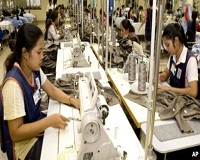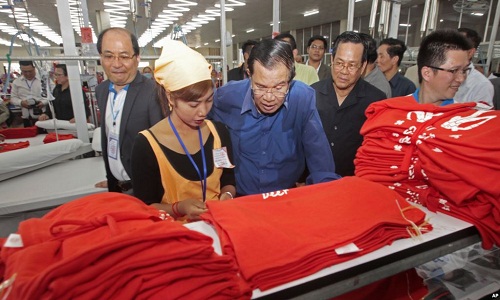"While textile is one of the most important sectors in Cambodia’s economy, pressures from neighbouring countries is adversely impacting growth. To add to it, increasing automation and loss of preferential trade agreements is aiding to its woes. Employing 86 per cent of all factory workers, about 40 per cent of Cambodia’s GDP comes from garment exports, while more than 800,000 people are employed in garment factories."

While textile is one of the most important sectors in Cambodia’s economy, pressures from neighbouring countries is adversely impacting growth. To add to it, increasing automation and loss of preferential trade agreements is aiding to its woes. Employing 86 per cent of all factory workers, about 40 per cent of Cambodia’s GDP comes from garment exports, while more than 800,000 people are employed in garment factories.
Rising wages a bane

Owing to its low-cost labour, Cambodia remains a favoured destination for global garment brands. But recent years have seen steep wage hikes for garment workers, and the trend has accelerated ahead of July’s national elections. Minimum wage increased from $61 in 2012 to $170 this year. And to lure garment workers ahead of elections, Prime Minister Hun Sen has announced many populist policies, including increased burden for businesses to pay into their workers’ funds at the National Social Security Fund. In a recent speech, he said experts say $250 per month is a reasonable minimum wage by 2023 or it could be even higher. This could prove catastrophic, say factory owners.
Eric Tavernier, CEO, France-based textile firm We Group, feels they cannot survive a 12 per cent wage increase every year. However, they don’t have immediate plans to leave the country. Indeed a significant number of factories feel the pressure and are considering moving out, not many are willing to come in. He feels, compared to Vietnam and China, the Cambodia has maintained its profitable edge only due to lower wages, as Cambodia’s transportation, freight and export costs were much higher than neighbouring countries. As competition is intense, they can’t pass on the price increase to consumers. While Vietnam has high wages but there’s better oversight, better shipping and more flexibility in the market. However, Heng Sour, Labour Ministry spokesman says increased costs and wage hikes have not deterred investment in the sector. The January elimination of export management fee, along with exemptions allowed to prepayment tax – a 1 per cent minimum tax obligation paid on monthly revenue flows – are expected to amount to a $40 million tax break for factories this year.
Anthony Galliano, CEO, Cambodian Investment Management says Cambodia needs to improve a wide range of factors if it hoped to keep investment flowing. Cambodia’s attractiveness and competitiveness has elevated over the last 10 years, primarily due to low labour costs. But infrastructure, productivity, energy costs and logistics must improve if it is to remain a major player.
Automation not easy choice
Stephen Higgins, Managing Partner, Mekong Strategic Partners feels if costs are going up faster than productivity, then Cambodia is at risk of losing factories to other countries in the region. Embracing automation is the only way they can improve productivity quickly to justify wage rises. David Tan, MD, MyTeb Cambodia, notes Cambodia lacks both trained workforce and infrastructure to support an automated factory. Electricity and uptime remain a critical challenge. Without steady and uninterrupted supply of energy, many of automated processes will be disrupted, causing multiple delays and unproductivity. On similar lines, Marco Kalinna, Founder, Cosmos Services says Cambodia can only be competitive in areas where labour costs are still an advantage. Mass-automation will find a place where electricity costs are affordable and there is proximity to markets, and Cambodia has none of these.
Preferential trade agreements
The EU imports more than 40 per cent of Cambodia’s garments, making EBA a cornerstone of the Kingdom’s economy. Kalinna says, removal of duty free (status) for garment exports to the EU would certainly have a shocking effect on the garments industry. If that happens, within 18 months, up to 50 per cent of manufacturers would move out of Cambodia. It still remains to be seen if the EU would enact such a measure. Higgins says there are more effective, targeted mechanisms for the EU to make their point than a broad brush approach like pulling the EBA.
The EU, prompted by protectionist concerns from member nations, launched an investigation into Cambodian rice exports last month – the first investigation of its kind of Cambodian exports. The decision was unrelated to labour rights or the political situation but the move indicates Europe won’t hesitate to re-evaluate Cambodia’s tariff-free status if it determines it would benefit its members’ interests. On rising concerns, Galliano points out while strong statements threatening concrete steps have been issued, withdrawal of preferences are rarely implemented.












